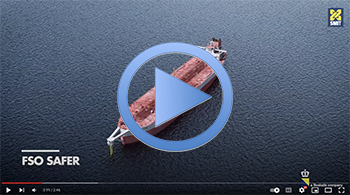FSO SAFER: Ship-to-ship transfer of oil to tanker Yemen

[Last updated August 2024]
Under a United Nations-coordinated initiative, the ship-to-ship transfer of more than 1.1 million barrels of oil from the decaying floating storage and offloading unit FSO Safer to a replacement tanker, the Yemen, was completed in August 2023, to avert a potential environmental disaster..
All works on the Safer, including plans for recycling, are now on hold due to the volatile situation in the Red Sea area.
IMO played a key supporting role in the initiative, aimed at preventing an oil spill from the FSO Safer, moored off the coast of Yemen.
IMO provided technical support and contracted a Crisis Management specialist to be onsite for the length of the operation. While the operation carried risks, there was extensive contingency planning. As part of this process, IMO assisted UNDP with the arrangement of the procurement and commissioning of specialized oil spill response equipment to mitigate a spill of oil. In addition to the procurement process, IMO requested and facilitated donations of equipment.
The oil recovery operation
Boskalis’ multipurpose support vessel Ndeavor was moored alongside the FSO Safer. Gas measurements were taken to assess the presence of toxic gas in and around the vessel. The team declared it "safe to access" which meant that critical inspections of the FSO and its deck machinery could be conducted, along with assessments of the structure of the hull. Mobile inert gas generators were loaded onboard for use in the operation to inert the FSO Safer's oil tanks in readiness for the oil transfer operation.
What was the situation of the FSO SAFER?
Prior to the transfer operation, the floating storage and offloading unit (FSO) Safer was located approximately 4.8 nautical miles off the coast of Yemen. It was originally built as an ultra-large crude carrier (ULCC) in Japan in 1976 and converted to an FSO in 1986. Since 1988, it has been moored at Ras Isa where, prior to the escalation of the conflict in 2015, it had been receiving, storing and exporting crude oil flowing from the Marib oil fields. The FSO Safer is owned by Yemen's national oil company, the Safer Exploration & Production Operation Company (SEPOC).
Due to the ongoing conflict in Yemen, all production and export operations related to FSO Safer were suspended in 2015, with an estimated 150,000 MT (around 1.1 million barrels) of crude oil remaining onboard. This corresponds to four times the amount spilled during the Exxon Valdez incident in 1989, even though circumstances differ greatly.
Prior to the arrival of SMIT in May 2023, the FSO had not been inspected or maintained since 2015, and had been out of class since 2016. This led to serious concerns about its integrity. No oil was leaking from the unit, but the risk of an oil spill from the FSO Safer increased as its structure, equipment and operating systems continue to deteriorate increased.
The main risks associated with the FSO were the possible structural failure of the unit following the lack of maintenance which could result in a leak from its cargo tanks due to a fracture on the hull, or as a large release due to an explosion from the build-up of flammable gases.
The situation was particularly complex due to conflict in the region. Efforts to mitigate the risk were futher hampered by the Covid-19 Pandemic.
Since the plans to address the FSO Safer were initiated by the UN in 2019, IMO has been supporting the contingency planning efforts aimed at enhancing preparedness to mitigate the environmental impacts of a potential spill, and providing technical input and support to United Nations Development Programme (UNDP) Yemen on relevant matters related to the "Operational Plan".
What could be the extent of the environmental damage in the event of a spill?
An oil spill in the region would be a major humanitarian and environmental disaster. A significant spill is likely to heavily impact the north-western coastline of Yemen, including the Yemeni Islands in the Red Sea, and Kamaran Island in particular. There is also a potential for oil to drift and impact neighbouring countries, including Djibouti, Eritrea and Saudi Arabia.
The area encompasses vulnerable ecosystems, including mangroves, coral reefs and bird habitats, as well as key infrastructures such as desalination plants and fishing ports.
The specific impacts of a spill would depend on variety of factors, such as the amount of oil spilled, the oil's weathering characteristics and the meteorological and oceanic conditions at the time. Various spill scenarios from FSO Safer were investigated to enhance the understanding of the potential damage to the environment. Oil Spill Trajectory Modelling was prepared by IMO.

What could be the impact of an oil spill for the local populations?
A major oil spill could impact many Yemeni coastal communities, who already rely on humanitarian aid to meet their basic needs. It would have a significant impact on the livelihoods and the health of the people relying on resources from the sea.
Fisheries along the Red Sea Coast of Yemen would likely be severely impacted, leading to hardship for fishing communities and substantial economic losses. An oil spill could also severely disrupt operations at the Hudaydah port, which is the point of entry for most imported goods.
What has IMO been doing to prepare the response in case of a spill?
Whilst prevention efforts were the primary focus for securing FSO Safer, adequate preparedness in the event of a spill is also essential to ensure a timely and coordinated response and mitigate the severity of impacts should there be a release. To this end, IMO has supported contingency planning aimed at enhancing preparedness at the national level in the event of a spill. These efforts aim to help improve the efficiency, effectiveness and management of emergency response operations in the event of a spill from the FSO Safer.
Key areas of focus of the planning efforts have included: identifying technical experts to assist in coordinating and managing a spill response at national and local levels; assessing the current capacity to respond to a spill; identifying equipment and resource requirements; and supporting the process for procurement of the required items for deployment to various locations in Yemen.
IMO works in close collaboration with the UN Resident Coordinator's Office for Yemen and the UNDP Yemen Office.
Call for additional response equipment
In April 2023, IMO, as part of UN-led efforts, called upon Member States to contribute used oil spill response equipment to supplement specialised equipment procured by UNDP and further enhance preparedness efforts in the event of a possible spill.
See
here for more information on Risk Assessment and Response Preparedness.
What could be the role of IMO in the event of a spill?
IMO is able to provide technical support to governments facing a significant oil spill, upon request. Such support may range from providing technical advice and assistance to relevant authorities and regional coordination centres to dispensing technical assistance through the deployment of experts.
Given the potential magnitude of a catastrophic spill in the region and the security considerations related to the ongoing conflict in Yemen, IMO would join UN system efforts in the event of a major international response.
What are the current challenges in preparing for and responding to an oil spill in Yemen?
The ongoing conflict and resulting instability in the region have had a significant impact on the contingency planning work. There are challenges in gathering complete and up-to-date information from stakeholders, amongst others. The current situation would also impact the capacity to mount a response in the event of an oil spill, in view of the limited resources in the area and, more importantly, the security situation arising from the civil conflict in Yemen.
IMO and UNDP have supported contingency planning workshops to strengthen Yemen's oil spill response capability. Following the first workshop in
Sana'a in February 2022, the second set of workshops were held in
Aden in March 2022, focussing on contingency planning and shorelines response management. Significant additional work to enhance preparedness has been ongoing since that time.
Read more/Resources
Watch UN Yemen's video below on the start of the critical ship-to-ship oil transfer operation:
FSO SAFER United Nations-Coordinated Proposal Explainer (11 October 2022)
A pledging event in May 2022, hosted by the Government of the Netherlands and the United Nations, marked the start in the effort to raise the $144 million that the oil transfer plan required, including the $80 million for the emergency operation.
Information on the plan to transfer the oil from the FSO SAFER can be found here - includes Pledging form / Explainer / Operational Plan / Oil Spill Trajectory Modelling
